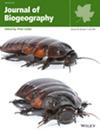Weak phylogenetic effect on specialist plant assemblages and their persistence on habitat islands
Abstract
Aim
The influence of species phylogenetic relatedness on the formation of insular assemblages remains understudied in functional island biogeography, especially for terrestrial habitat islands (i.e. distinct habitat patches embedded in a matrix that differ in the prevailing environmental conditions). Here, we tested three eco-evolutionary hypotheses: (1) functional specialization of species (i.e. specialism) is associated with phylogenetic clustering at the habitat archipelago scale, (2) such clustering increases with insularity at the habitat island scale and (3) traits indicative of effective local persistence strategies shape island specialism.
Location
Terrestrial habitat islands, Europe (Fens in the Western Carpathians, Outcrops in Moravia and Mountaintops in the Cantabrian Range).
Taxon
Angiosperms.
Methods
We assessed the phylogenetic relatedness of habitat specialists in three different archipelagos composed of terrestrial habitat islands based on phylogenetic signals and phylogenetic diversity (PD) measures. We estimated the effect of insularity on PD using linear models and the effect of persistence traits on specialism using phylogenetic logistic regressions.
Results
Our hypotheses were largely not supported. Outcrop and mountaintop specialist assemblages did not exhibit any phylogenetic structuring, whereas fen specialists were clustered at the archipelago scale. Therefore, insularity seems not to act as a selective force for phylogenetic structure, and ecologically important persistence traits do not operate as precursors of specialism.
Main Conclusions
Our results show that species phylogenetic relatedness plays a minor role in shaping habitat island specialist assemblages. Furthermore, the effects of phylogenetic relatedness on assemblages of island specialists are system and scale dependent. Finally, accounting for species' phylogenetic relatedness on persistence traits yielded results similar to previous studies, which corroborates the positive relationship between insularity and functional traits (indicative of enhanced plant persistence abilities with increasing within-archipelago insularity).

 求助内容:
求助内容: 应助结果提醒方式:
应助结果提醒方式:


